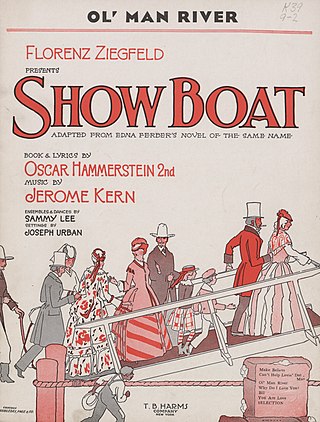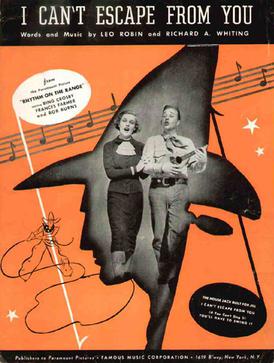Related Research Articles

Show Boat is a musical with music by Jerome Kern and book and lyrics by Oscar Hammerstein II. It is based on Edna Ferber's best-selling 1926 novel of the same name. The musical follows the lives of the performers, stagehands and dock workers on the Cotton Blossom, a Mississippi River show boat, over 40 years from 1887 to 1927. Its themes include racial prejudice and tragic, enduring love. The musical contributed such classic songs as "Ol' Man River", "Make Believe", and "Can't Help Lovin' Dat Man".
"In the Cool, Cool, Cool of the Evening" is a popular song with music by Hoagy Carmichael and lyrics by Johnny Mercer. It was originally planned to feature it in a Paramount film written for Betty Hutton that never took off, which was to be called The Mack Sennett Girl. The song was buried in Paramount's files until it was rediscovered and then used in the 1951 film Here Comes the Groom and won the Academy Award for Best Original Song.
"Wish You Were Here" is a popular song with music and lyrics by Harold Rome, the title tune from his 1952 show, Wish You Were Here. It was introduced in the show and on the RCA Victor cast album by Jack Cassidy.
"Pretty Baby" is a song written by Tony Jackson during the Ragtime era. The song was remembered as being prominent in Jackson's repertory before he left New Orleans in 1912, but was not published until 1916.
"All Alone" is a popular waltz ballad composed by Irving Berlin in 1924. It was interpolated into the Broadway show The Music Box Revue of 1924 where it was sung by Grace Moore and Oscar Shaw. Moore sat at one end of the stage under a tightly focused spotlight, singing it into a telephone, while Oscar Shaw sat at the other, doing the same.
"Dancing in the Dark" is a popular American song, with music by Arthur Schwartz and lyrics by Howard Dietz, that was introduced by John Barker with Tilly Losch dancing in the 1931 revue The Band Wagon. The song was first recorded by Bing Crosby on August 19, 1931 with Studio Orchestra directed by Victor Young, staying on the pop charts for six weeks, peaking at #3, and helping to make it a lasting standard.
The 1941 recording by Artie Shaw and His Orchestra earned Shaw one of his eight gold records at the height of the Big Band era of the 1930s and 1940s. Shaw's 1940 arrangement was a collaboration between Shaw and his chief arranger, Lenny Hayton, who was also an important Music Director, Music Arranger and Orchestrator at MGM until 1953.
"It's Easy to Remember " is a popular song written by Richard Rodgers with lyrics by Lorenz Hart.
"South of the Border Down Mexico Way" is a popular song describing a trip to Mexico, written by Jimmy Kennedy and Michael Carr and published in 1939 for the film of the same name starring country star Gene Autry.
"Street of Dreams" is a song and foxtrot composed in 1932 by Victor Young, with lyrics by Sam M. Lewis. There were three successful recordings of the song in 1933 by Guy Lombardo, Ben Selvin and Bing Crosby.
"Isn't This a Lovely Day?" is a popular song written by Irving Berlin for the 1935 film Top Hat, where it was introduced by Fred Astaire in the scene where his and Ginger Rogers' characters are caught in a gazebo during a rainstorm. The lyric is an example of a song which turns a bad situation into a love song, a common style for Irving Berlin, as in I've Got My Love to Keep Me Warm and Let's Have Another Cup of Coffee.
"Now It Can Be Told" is a popular song written by Irving Berlin for the 1938 film Alexander's Ragtime Band, where it was introduced by Alice Faye and Don Ameche. It was nominated for an Academy Award in 1938 but lost out to "Thanks for the Memory".

"Why Was I Born?" is a 1929 song composed by Jerome Kern, with lyrics written by Oscar Hammerstein II.
"I Guess I'll Have to Change My Plan" is a popular song published in 1929, with music by Arthur Schwartz and lyrics by Howard Dietz.
"Along the Navajo Trail" is a country/pop song, written by Dick Charles, Larry Markes and Eddie DeLange in 1945, and first recorded by Dinah Shore in May 1945.

Show Boat is a 1951 American musical romantic drama film, based on the 1927 stage musical of the same name by Jerome Kern (music) and Oscar Hammerstein II, and the 1926 novel by Edna Ferber. It was made by MGM, adapted for the screen by John Lee Mahin, produced by Arthur Freed and directed by George Sidney.
"You Are Love" is a song by Jerome Kern and Oscar Hammerstein II from their classic 1927 musical play Show Boat. It is sung twice in the show - first, by Magnolia Hawks, the heroine, and riverboat gambler Gaylord Ravenal when they agree to marry near the end of Act I, and again in the penultimate scene of Act II by Ravenal when he returns to Magnolia after having deserted her for 23 years.
"Bouquet of Roses" is a 1948 song written by Steve Nelson (music) and Bob Hilliard (lyrics). It was originally recorded by Eddy Arnold and his Tennessee Plow Boys and his Guitar in Chicago on May 18, 1947. It was released by RCA Victor as catalogue number 20-2806 and by EMI on the His Master's Voice label as catalogue numbers BD 1234 and IM 1399. "Bouquet of Roses" was Eddy Arnold's third number one in a row on the Juke Box Folk Record chart and spent 19 weeks on the Best Selling Folk Records chart. In 1949, when RCA Victor introduced its new 45 RPM single format this record was among seven initial releases and the first in the Country and Western category. Arnold would re-record "Bouquet of Roses" several times during his career.
"The Folks Who Live on the Hill" is a 1937 popular song composed by Jerome Kern, with lyrics by Oscar Hammerstein II.

"I Can't Escape from You" is a song written music by Richard A. Whiting and lyrics by Leo Robin for the 1936 Paramount Film "Rhythm on the Range", and first introduced in the film when Bing Crosby sang it to Frances Farmer. Crosby recorded it for Decca Records that same year with the Jimmy Dorsey Orchestra and it was in the hit parade for 11 weeks reaching a peak position of No. 7. Crosby recorded the song again in 1954 for his album Bing: A Musical Autobiography.
I See Your Face Before Me is a popular song composed by Arthur Schwartz, with lyrics by Howard Dietz. It was introduced by Evelyn Laye and Adele Dixon in the 1937 Broadway musical Between the Devil. Two recordings of the song made the charts shortly after the show's debut: Guy Lombardo & His Royal Canadians reached number 12, and Glen Gray & The Casa Loma Orchestra made it to number 13.
References
- ↑ Whitburn, Joel (1986). Joel Whitburn's Pop Memories 1890-1954 . Wisconsin, USA: Record Research Inc. p. 450. ISBN 0-89820-083-0.
- ↑ "A Bing Crosby Discography". BING magazine. International Club Crosby. Retrieved April 30, 2017.
- ↑ "45worlds.com". 45worlds.com. Retrieved May 1, 2017.
- ↑ "Discogs.com". Discogs.com. Retrieved May 1, 2017.
- ↑ "allmusic.com". allmusic.com. Retrieved May 1, 2017.
- ↑ "Peggy Lee Discography". peggyleediscography.com. Retrieved May 1, 2017.
- ↑ "Discogs.com". Discogs.com. Retrieved April 30, 2017.
- ↑ "Discogs.com". Discogs.com. Retrieved May 1, 2017.
- ↑ "Discogs.com". Discogs.com. Retrieved May 1, 2017.
- ↑ "78discography.com". THE ONLINE DISCOGRAPHICAL PROJECT. Retrieved May 1, 2017.